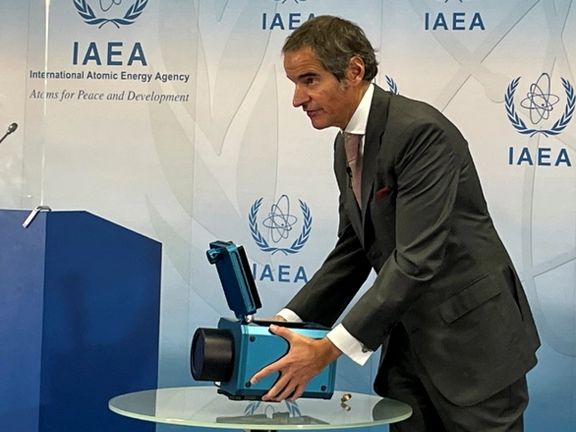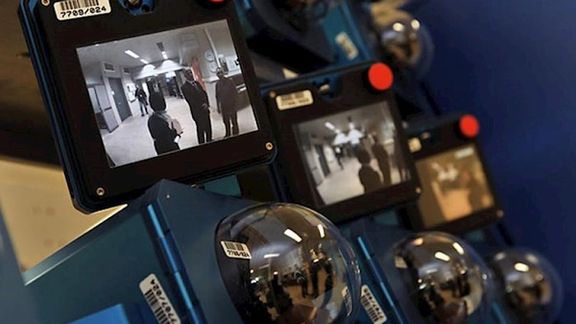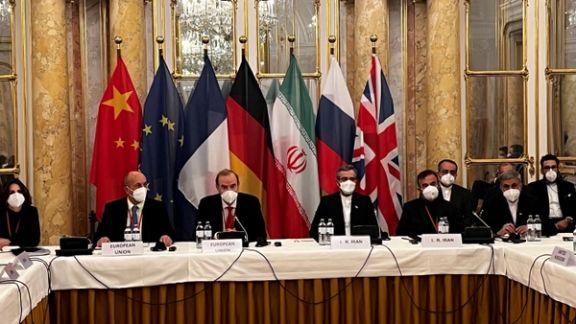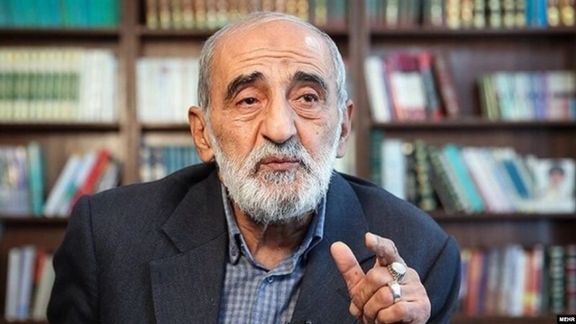Iran Government Website Slams European Troika For Role In Nuclear Talks

The official government news website, IRNA on Friday harshly attacked the European troika in the Vienna nuclear talks, accusing them of preventing an agreement.

The official government news website, IRNA on Friday harshly attacked the European troika in the Vienna nuclear talks, accusing them of preventing an agreement.
IRNA quoted an “informed source” in Vienna as saying that the United Kingdom, France and Germany (E3) have adopted a negative stance to the extent that even the United States is unhappy. The source claimed that the E3 are working to sabotage a restoration of the 2015 nuclear agreement, JCPOA.
The three European allies of the United States had criticized Tehran earlier in the week, saying so far in December no serious negotiations have taken place and time for restoring JCPOA is fast running out.
IRNA further claimed that France is particularly playing a negative role, including leaking negative information about the talks. It added that the E3 are coordinating their position in the negotiations with Israel and the two sides had discussion and mutual visits to chart the failure of the Vienna negotiations. IRNA said that the UK even wants a new agreement to replace JCPOA.
After a five-month break in the talks, Iran returned to the negotiating table on November 29, putting forth new demands and refusing to continue talks based on previous understandings.

The United Nations atomic watchdog has doubts that footage from a surveillance camera at an Iranian centrifuge plant is missing after an apparent attack there in June.
Iran has not produced the footage, Rafael Grossi, the head of the International Atomic Energy Agency (IAEA) said on Friday.
The issue was not addressed by an agreement between Iran and the IAEA on Wednesday that allowed the IAEA re-install cameras at the Karaj workshop that Iran removed after the apparent attack, which Tehran blames on Israel.
Iran had since refused the IAEA access to replace cameras damaged in the incident, part of an ongoing hardline tact taken by Tehran at negotiations underway in Vienna over its tattered 2015 nuclear deal with world powers.
The new agreement this week should end a months-long standoff over IAEA access there.
In response to a question by Iran International Grossi said that Iran's request to check new cameras before installation is not something new and other countries also routinely do that.
Grossi also indicated that there was no opposition from the United States to his organization's latest agreement with Iran.

Iran says one of four IAEA cameras at the Karaj facility producing uranium enrichment machines was destroyed in the June incident. Iran removed all four cameras and showed them to the IAEA, but the destroyed camera's data storage device was not included. The IAEA and Western powers have been asking Iran to explain, unsuccessfully so far.
"We have doubts about that and this is why we are asking, 'Where is it?’" Grossi told a news conference when asked if it was credible that the footage simply vanished.
"I am hopeful that they are going to come up with an answer because it's very strange that it disappears."
The agreement on Karaj avoided a diplomatic escalation that threatened to scupper wider talks on rescuing the 2015 Iran nuclear deal (JCPOA).
Talks between Iran and world powers since April to bring both the United States and Iran back to compliance with JCPOA have so far failed to produce a result. The US withdrew from the agreement in 2018 and Iran responded by increasing uranium enrichment.
The cameras are aimed at verifying Iran is not secretly siphoning off the parts for uranium-enriching centrifuges that are made there, but the footage will remain under seal in Iran, so the IAEA cannot view it for now, as has been the case at various locations since February.
The IAEA has not been able to verify whether Karaj has resumed operations, but Grossi said "it would be a logical conclusion" that advanced centrifuges recently installed at Fordow, a site buried inside a mountain, came from there.
With reporting by Reuters and AP

The hardliner Jalili brothers, opposed to the 2015 nuclear agreement, JCPOA, are expanding their influence in the Iranian government, some media in Tehran say.
Iranian State TV Chief Payman Jebelli on Thursday appointed hardline commentator Vahid Jalili as his deputy in charge of cultural programming with a separate mandate as the official to introduce "change" in the state TV.
Vahid Jalili is the brother of Saeed Jalili, former nuclear negotiator in ex-president Mahmoud Ahmadinejad’s administration and a staunch critic of JCPOA.
During the past few days Iranian media speculated that the development could mean Saeed Jalili’s influence is expanding in President Ebrahim Raisi’s government, and given his past record as a bombastic negotiator, this will not bode well for current nuclear talks in Vienna.
The Iranian Students News Agency ISNA, which broke the news about the appointment on Thursday, revealed that Vahid Jalili is not just any deputy chief. Jebelli officially appointed him as Acting Director of the Islamic Republic of Iran broadcasting Organization IRIB) while praising his "capabilities and long experience in the area of revolutionary art."
Moderate news website Rouydad 24, is one of the Iranian media outlets that has said the development will inevitably put Saeed Jalili in a better position to impose his ideas on Iran’s nuclear negotiators, particularly his former deputy Ali Bagheri-Kani who is now Iran's chief envoy in the talks.
Although Vahid Jalili is not officially in charge of programming in the state TV as was earlier speculated, still his mandate includes "Promoting the quality of programs to make them compliant with the ideas of the Supreme Leader" who believes "TV programming is one of the battlefronts of soft war."
ISNA reminded its readers that Vahid Jalili's background include publishing ‘revolutionary’ material and founding the Research Institute for the Cultural Front of the Revolution. This possibly means he would toughen Iran's only broadcaster's position on the nuclear negotiations.
According to Rouydad24, a political current in Iran is trying to obstruct the negotiations to revive the 2015 nuclear deal while some Iranian commentators hope the new round of talks that started last week would prove fruitful, as Iran agreed to allow the UN nuclear watchdog, IAEA, to reinstall cameras at a nuclear site near Tehran.
Clearly referring to the time when Saeed Jalili and Bagheri-Kani were in charge of the negotiations in early 2010s, Rouydad24 charged that this is the same faction which steered nuclear negotiations for eight years during Ahmadinejad's presidency without any tangible outcome. Not only they did not reach an agreement with world powers, but their bombastic approach resulted in several UN Security Council resolutions against Iran.
The same team's nuclear chief Fereydoun Abbasi this week told Rouydad24 that "It is now the best time for Iran to leave the JCPOA for good."
Meanwhile, Amir Hossein Sabeti a political activist close to the Jallii brothers wrote on Twitter: "It is unlikely that the United States would enter into a good agreement with Iran after several years of enmity. It is more likely that not reaching an agreement would secure Iran's interests rather than an agreement." He added that the rise and fall of the rate of exchange has nothing to do with Jalili and Bagheri's men and only Raisi's economic ministers should be accountable for that.
Bagheri has said several times since the start of the nuclear talks that Iran is not taking part in "nuclear negotiations" with the West and that the Iranian team’s only objective is to have the sanctions lifted.
In November 2017, ISNA wrote that Jalili has been going around delivering speeches against the JCPOA at various universities. According to ISNA, the highlight of Jalili's speeches was that "The JCPOA has had no benefit for us and has only imposed a high cost on Iran."

The remaining parties to the 2015 Iran nuclear deal plan to meet on Friday at 1300 GMT to adjourn talks on salvaging the deal, three diplomats said on Thursday.
The indirect US-Iran talks on bringing both back into full compliance with the deal are in their seventh round. One of the diplomats said they were due to resume on Dec. 27, while another gave a time frame between Christmas and the New Year.
Under the agreement, Iran had limited its nuclear program in return for relief from US, European Union and United Nations economic sanctions.
Then-President Donald Trump, a Republican, pulled the United States out of the accord in 2018 and reimposed US sanctions, prompting Iran to begin violating its nuclear restrictions in 2019.
Democrat Joe Biden, has sought to revive the deal via indirect talks in which officials from other parties - Britain, China, France, Germany, Russia, as well as the European Union - shuttle between US and Iranian diplomats because Tehran refuses to meet directly.
Britain, France and Germany have sounded pessimistic about resuscitating the agreement, saying on Tuesday "we are rapidly reaching the end of the road" to save it as Tehran accused Western powers of engaging in a "blame game."
Reuters Report

Iran’s atomic energy spokesman said Thursday that Tehran and the IAEA had agreed to reinstall cameras at the Karaj plant after examination by Iranian experts.
Behrouz Kamalvandi,of the Atomic Energy Organization of Iran (AEOI), said staff from the International Atomic Energy Agency would “answer the technical questions of our security and safety experts… [and that] after careful and necessary checks, the agency’s cameras will be re-installed.”
An IAEA statement Wednesday said surveillance cameras removed from the facility would be back in place in coming days.
The Karaj plant, which makes components for the Iranian nuclear program, was in June hit by a drone strike, widely attributed to Israel. Months later Tehran said it suspected security breaches and refused to allow the replacement of surveillance cameras damaged in the attack, complicating talks between Tehran and the IAEA over an already delicate temporary access arrangement agreed in February.
Kamalvandi noted that, according to the usual protocols, Iran would not open the cameras without IAEA consent. He said footage would be sealed jointly by Iran and the IAEA.
Under a law passed in Iran in December 2020, the Iranian authorities will not allow the agency access to the footage until Tehran resumes applying its Additional Protocol, which allowed greater IAEA access to Iranian nuclear sites.
Such access was required under the 2015 nuclear deal, which talks in Vienna between Iran and world powers are seeking to revive after the United States in 2018 left the agreement, the JCPOA (Joint Comprehensive Plan of Action), and imposed ‘maximum pressure’ sanctions.
‘Preventing excuses’
Mohamad Eslami, AEOI chief, said Thursday Iran had agreed to allow access to Karaj to "prevent giving excuses to enemies who try to bar the Iranian negotiation team from reaching its aim of the lifting of [US] sanctions.” While the IAEA is not directly part of the Vienna nuclear talks, the US has threatened a motion censuring Iran at the IAEA governing board, so complicating matters in Vienna.
Opponents of the JCPOA in Iran criticized the IAEA agreement over Karaj as an unnecessary concession. In a commentary headlined "Questionable Agreement with IAEA Before Progress in Vienna Talks,” hardliner Kayhan newspaper called it "a gift to the pressure and sabotage trio," referring to the western European JCPOA signatories, France, Germany, and the United Kingdom.
“The recent pressures are a kind of division of labor among Iran's adversaries,” Kayhan observed. “The US uses diplomatic pressure in the talks through the European troika, the dirty work of sabotage and terror lies with Israel, and the IAEA leads the propaganda and pressure on Iran under the guise of technical [issues.”
The aim of the US and the three European powers, the paper argued, was to “re-impose JCPOA's restrictions [on Iran’s nuclear program] without real and effective lifting of sanctions.”
Kayhan, which is the flagship ultra-conservative newspaper is financed by Supreme Leader Ali Khamenei’s office.

All sanctions on Iran should be lifted, Kayhan newspaper said Thursday after Tehran’s agreement over UN inspections raised hopes for the Vienna nuclear talks.
Hossein Shariatmadari, the paper’s hardline editor and a long-time critic of nuclear negotiations, criticized Iranian representatives for recent remarks referring to lifting of "JCPOA-related" instead of "all" sanctions as the aim of talks.
The veteran editor, whose newspaper is financed by Supreme Leader Ali Khamenei’s office, was a critic of the 2015 nuclear deal, the JCPOA (Joint Comprehensive Plan of Action), which talks in Vienna are working to revive after the United States left in 2018 and imposed ‘maximum pressure’ sanctions on Iran.
Shariatmadari argued that the recent statements from Iranian negotiators were inconsistent with promises made by President Ebrahim Raisi (Raeesi) when he took office in August.
"What's the use of Vienna talks, what's the purpose behind them, and how can they be justified if the lifting of sanctions is to be limited to JCPOA-related sanctions and the same sanctions are to remain under other delusive, hostile pretexts such as human rights, terrorism, missile industries, regional presence, and so on," Shariatmadari wrote.

During the June election, Raisi said he would, if it were in “the people’s interests,” support restoring the JCPOA, which imposed limits on Iran’s nuclear activities that it has breached since 2019. But Raisi’s victory enthused many opponents of the deal, including the Kayhan editor.
Shariatmadari demanded in his editorial that talks be stopped until Israel, India, Pakistan signed the Nuclear Non-Proliferation treaty and gave up their nuclear weapons. "Why should Iran remain an NPT member when it can leave the treaty according to its Article 10?” he asked.
Hopes for the Vienna talks were boosted Wednesday as the United Nations’ International Atomic Energy Agency (IAEA) announced Tehran had agreed to allow agency inspectors to service equipment at the Karaj manufacturing plant.
Tehran had barred the IAEA from the site, which manufactures parts used in the nuclear program, following an attack in June widely attributed to Israel. IAEA chief Rafael Mariano Grossi claimed Iran had agreed in September, under the latest temporary arrangement for access, to inspectors replacing equipment, including cameras, at the site. Early in the year, Tehran cut back access more or less to that requited by the NPT.
‘Real breakthrough’
"This is important for verification under the Iran nuclear deal, and work will continue to address other outstanding safeguards issues," the IAEA chief Rafael Grossi tweeted Wednesday. While the IAEA is not directly involved in the Vienna talks, it would be expected to monitor a revived JCPOA and is the main source of information internationally on the Iranian nuclear program.
Tehran's move apparently improved the atmosphere in Vienna. Mikhail Ulyanov, Russia’s lead negotiator in the talks, tweeted that the agreement was a “real breakthrough” that “fully corresponds to the needs of int. [sic] community.”
"At least I don’t hear anymore rumours [sic] about extraordinary IAEA Board of Governors meeting,” Ulyanov wrote, referring to US threats to raise a motion censuring Iran at the agency’s governing body.
A US official told Reuters Wednesday that the US would not seek an IAEA board meeting if Iran implemented the agreement." Of course, if there are any new nuclear escalations, we would react accordingly," the official added.